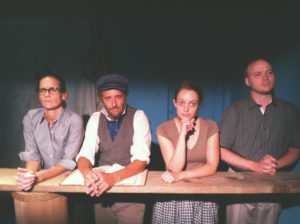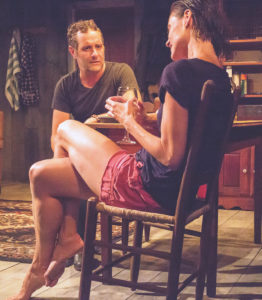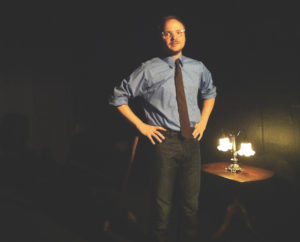
For their first seven years, the four actor-founders of the Harbor Stage Company — Robert Kropf and Stacy Fischer, Brenda Withers and Jonathan Fielding — who run the small Wellfleet theater at 15 Kendrick Ave. on their own without a board, had an affordable place in Wellfleet to live in year-round.
“It’s really important in a vocation where there’s so much unknown, always, that we have a base, a place to breathe and rest and regroup and operate,” Kropf says via email. “We’re unique in that the four of us live together in the summer. Pretty much all of our administrative-brainstorming work happens in the kitchen. ‘Production meetings’ are more like a conversation over coffee with messed-up hair. It’s just the way we work.”
Last year, the Outer Cape real-estate market finally caught up with them. “We lost our spot, because it was on the market and it was sold,” Withers says by phone on Sunday, before running off to a rehearsal. “We were stunned by the sticker price. This summer, we ended up renting for two months. It’s pretty scary for us. We rent the theater year to year — it’s not permanent. This was the first time we realized that maybe we won’t be able to stay.”
The 2019 season offered two plays, the original comedy The Hermitage — in which a yuppie couple dally with the idea of housing a homeless artist — and a powerful production of Chekhov’s Three Sisters, instead of the company’s usual three, as well as a series of readings. Withers says it was a way to have longer runs during the short summer season.
“People were frustrated about not getting in,” she says. And it also made the “constantly in rehearsal, constantly in production thing” less pressurized. “We’re just going to make it work however we can. But if there’s a year when donations drop or the economy fails, we just might not be able to do it.”
The two couples who founded the Harbor Stage met while performing at the Wellfleet Harbor Actors Theater, which was based at the 15 Kendrick Ave. building before it built the Julie Harris Stage on Route 6.

“Twenty years ago, when I drove down to the harbor and saw the space for the first time,” Kropf says, “I felt home. The truth is, we all fell pretty hard for the Cape. We’re not officially locals, though I’d call us that. We do leave in the off-season. Dividing our time means we have to cover housing year-round at our home bases, which makes it difficult at both ends. Stacy and I live in Boston; Jon and Bren, in New York. But as the company grows more and more permanent, our desire for permanent housing on the Cape has become a priority.”
A few years ago, Withers says, “We looked into buying a place. We quickly realized that that was untenable.” They applied to the housing lottery in Wellfleet for affordable housing, but when a place became available, Fielding had gotten a job that disqualified them because of personal income limits.
“Because we are our own board,” Kropf says, “we do what we want the way we want it. The downside is that fund-raising is challenging, as we only have so much time and energy. The housing issue is directly related. Our supporters, volunteers, audiences, and community are incredibly generous and loyal, but without large, corporate sponsorships or heavy-hitter philanthropists, sustainability has become more piecemeal, year to year. Which is demanding — a constant reckoning.”
The company is always balancing the financial realities of running a theater with its original aims in doing so, such as keeping ticket prices low. “It’s important, on the Cape and off,” Withers says. “Theater has become less popular because audiences feel less welcome. One solution that’s been suggested to us would be to raise the price of tickets. And we have raised it, from $20 originally to $23 now. That was a huge discussion.”

Kropf says that he and Withers, in particular, have always shared a “like-mindedness in terms of working. And a desire to self-produce, to create our own work, pave our own way, have artistic control. There’s always been a natural ease with which the four of us get along. I think of us more like a band than a theater company.”
Withers concurs. “I’m very grateful that we’re all just great friends,” she says. “It’s a horizontal power structure. Certainly, the four of us feel equal. It’s a real ensemble. Everyone has a voice. That’s unusual. As a holistic experiment, it’s been very successful.”
What they’re not interested in, Kropf says, is “anything resembling a corporate structure. This attitude informs pretty much every aspect of our scrappy operation. For example, play and season selection happens when it happens. Usually very late in the process. We take the time to find what is the most interesting, inspiring, immediate thing we want to work on. We have the time and the ability to prioritize the artistic process over the bottom line. It’s a struggle, but we think it’s important. In general, I’d say we’re long-gamers, in for the long haul. So it’s important to us to strike the balance between idealism and pragmatism. We’ve almost cracked it. Almost.”
